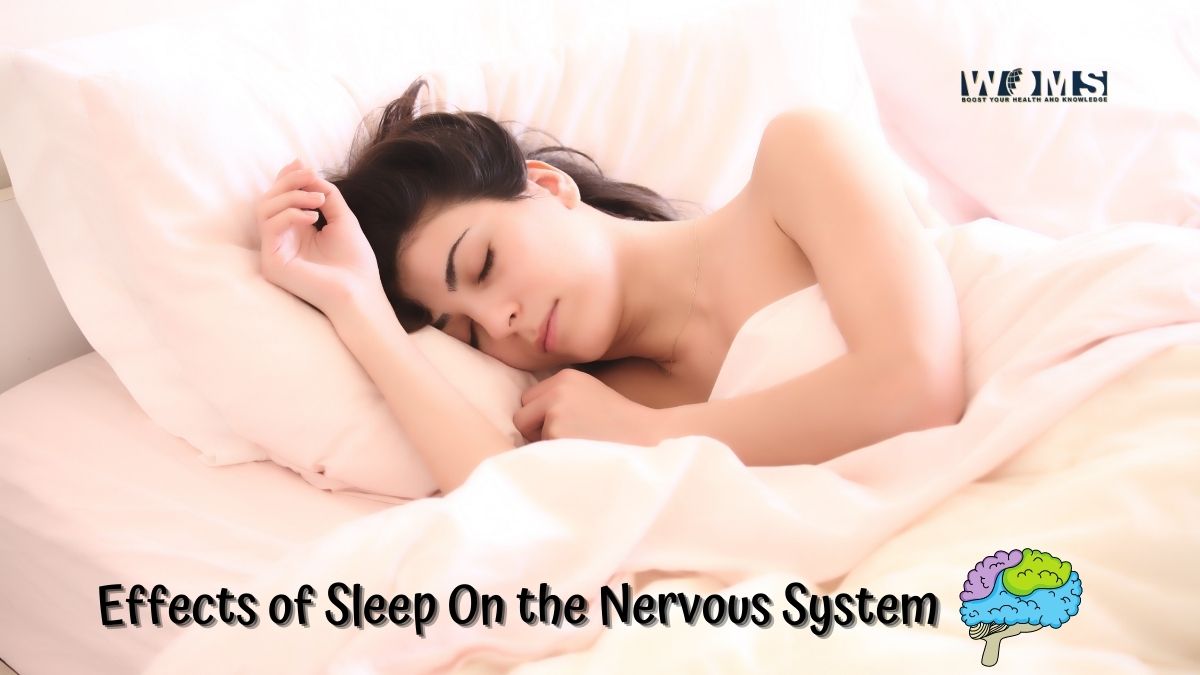What Are the Effects of Sleep On the Nervous System?

Sleep affects virtually every tissue in the body. The neurological system and nervous system are the two systems that control sleep the most and sleep can have profound effects on how these systems function. Combined with sleep; a healthy diet, exercise regimen, and supplements can help ensure your nervous system’s health.
What does the nervous system do when you sleep and how can the lack of sleep affect this integral system that controls all of your movements, both voluntary and involuntary? Continue reading to find out.
The Neurophysiology of Sleep
Hypothalamus
The hypothalamus is a peanut-sized structure located deep within the brain that contains nerve cells responsible for controlling things such as sleep and arousal. Within the hypothalamus lies the suprachiasmatic nucleus (SCN), clusters of thousands of cells that receive information about light exposure directly from the eyes and control your circadian rhythms.
People who have sustained damage to the SCN often sleep erratically throughout the day because they can’t match their circadian rhythms to the light-dark cycle. Most blind people can also sense some light and are able to modify their sleep schedule based on this light sensitivity.
Brain Stem
The brain stem communicates with the hypothalamus about controlling transitions between wakefulness and sleep. The pons, medulla, and midbrain are all located in the brain stem. Sleep-promoting cells within the hypothalamus and the brain stem produce a chemical called GABA, which reduces the arousal centers in the hypothalamus and the brain stem. The pons and medulla play significant roles in REM sleep by sending signals to relax muscles essential for body posture and limb movements so we don’t act out our dreams.
Thalamus
The thalamus is the part of the brain that relays information from the cerebral cortex to the rest of the body. The thalamus becomes quiet during most stages of sleep except REM, during which it sends the cortex images, sounds, and other sensations that fill our dreams.
Pineal Gland
The pineal gland, located within the brain’s two hemispheres, receives signals from the SCN and increases the production of the hormone melatonin, helping you sleep. Scientists believe that spikes and drops in melatonin throughout sleep help the body match its circadian rhythm to the cycle of light and darkness.
The Basal Forebrain
The basal forebrain is located near the front and bottom of the brain and promotes sleep and wakefulness while the other part of the midbrain acts as an arousal system. The release of adenosine from cells in the basal forebrain supports your sleep drive. Caffeine counteracts drowsiness by blocking the actions of adenosine.
The amygdala also becomes increasingly active during REM sleep.
The Role of Neurotransmitters In Sleep
There are clusters of sleep-promoting neurons responsible for regulating sleep that become more active as we get ready for bed. These nerve-signaling chemicals called neurotransmitters switch off or dampen the activity of cells that signal arousal or relaxation. GABA secretes to stifle muscle activity. Norepinephrine, orexin, acetylcholine, histamine, adrenaline, cortisol, and serotonin are also closely associated with sleep.
The Effect of Sleep on the Nervous System
You might be under the impression that your nervous system and your brain go to sleep while you sleep but that couldn’t be further from the truth. In fact, some parts of the brain and nervous system are actually more active during sleep than wakefulness.
During sleep, your sympathetic nervous system, the nervous system that controls your fight or flight response, relaxes. Studies have shown that when we sleep, sympathetic nervous system activity increases, mirrored by an increase in blood pressure. Scientists studying coronary disease are investigating the correlation between decreased sleep duration and the increased risk of heart disease.
Additionally, sleep deprivation can impair the normally reciprocal associations between the central and peripheral signaling systems, which are most prominent at the level of cardiac-amygdala coupling. REM sleep physiology also predicts whether the emotional discrimination within the viscerosensory network, suggesting REM sleep might be responsible for brain cultivation.
Central Nervous System
Your central nervous system (CNS) is the information highway of your body and sleep is responsible for the necessary recalibration that facilitates the proper function of the CNS. For example, chronic insomnia can disrupt how your body sends and processes information.
If sleep deprivation continues, you can start having hallucinations and it can trigger mania in people with a bipolar mood disorder. Other psychological risks include:
- Impulsive behavior
- Anxiety
- Depression
- Paranoia
- Suicidal thoughts
Sleep and the Immune System
While you sleep your immune system produces protective infection-fighting substances like antibodies and cytokines. Your immune system uses these substances to combat foreign invaders such as bacteria and viruses. Some cytokines can also help produce sleep, giving your immune system more efficient to defend against body illness.
Conclusion- What Are the Effects of Sleep on the Nervous System?
Sleep has numerous effects on the body’s performance and failing to adhere to a healthy sleep schedule can drastically hinder your performance and cause damage to various systems in your body such as your immune and nervous system.
We don’t understand the full physiological effects of what occurs during sleep and how to optimize human sleeping patterns to accomplish their full potential. However, studies are underway examining the full effects of sleep on the body and the nervous system. There are also supplements that can support the nervous system such as Nerve Control 911.




